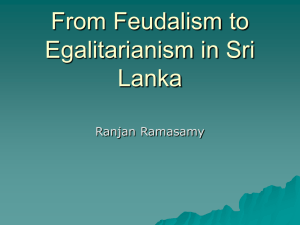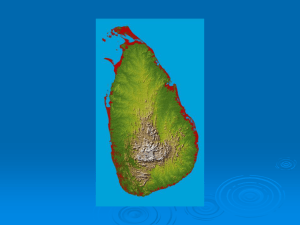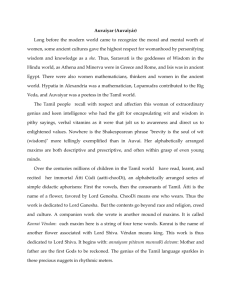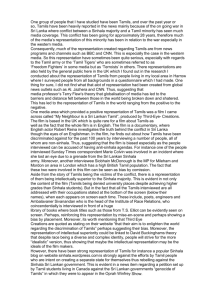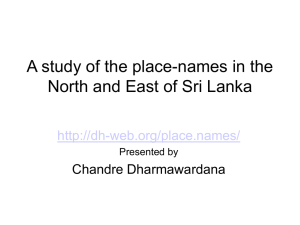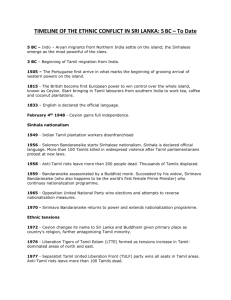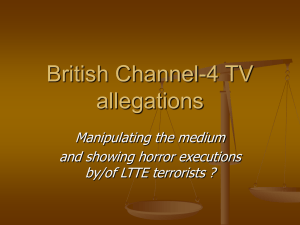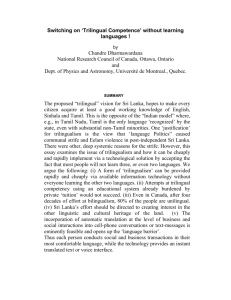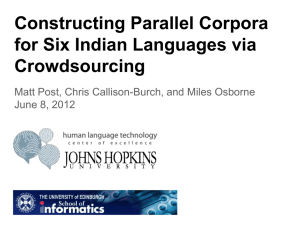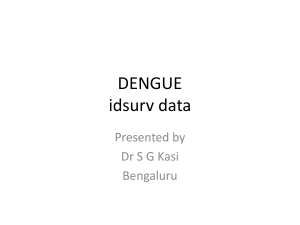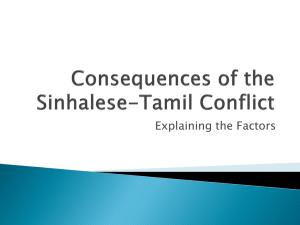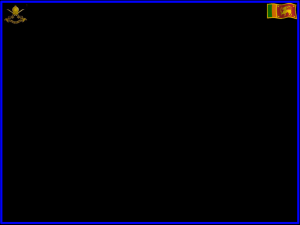Introducing a New Product - dh
advertisement
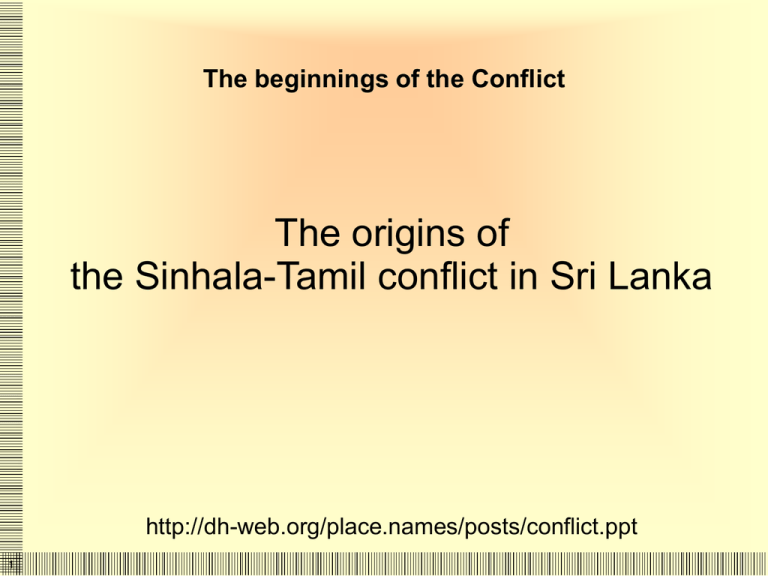
The beginnings of the Conflict The origins of the Sinhala-Tamil conflict in Sri Lanka http://dh-web.org/place.names/posts/conflict.ppt 1 A bit of History 2 Jaffna Peninsula ( Yapa Patuna) captured by the Portuguese by defeating Sinhalese General (Athapattu Dissava) in 1591 The Dutch captured all Portuguese territories ( Green) by 1658. The Dutch brought “Malabar Tamils” to grow tobacco in the North (Jaffna) http://dhweb.org/place.names/posts/conflict.ppt British colonial rule 3 The British drove out the Dutch, and took over the Kandyan kingdom by a treaty signed in 1815 . Kandyan peasants ousted for Land The 1910 ruling council had 2 Europeans, one Burgher and one Tamil (Sir Ponnambalam Ramanathan) of the “highest caste” for all Ceylonese. Divide and rule policy of promoting the minority against the majority. G. G. Ponnambalam: 4 from Casteism to Racism G. G. Ponnambalam, a young Tamil Lawyer opposes Donoughmore reforms and rejects the “one nation of Ceylonese” concept and calls himself a proud Dravidian (Hansard 1935). Claims that the Tamils were the first inhabitants of Sri Lanka. GGP begins violently racist politics, verbally attacking the Sinhalese & the Mahavamsa. The campaign leads to the first communal riot in 1939, quickly put down by the British. http://dh-web.org/place.names/posts/conflict.ppt Tamil opposition to Universal voting rights 5 Donoughmore commission (1929 CE) proposes one vote per adult (universal suffrage). Tamil leaders TOTALLY OPPOSED UNIVERSAL SUFFRAGE, and Sinhala Majority rights. They also asked for the caste system in the constitution. G G Ponnambalam demands 50 seats for Sinhala 75% and 50 seats for the 15% Tamils & minorities. 50:50 “equal rights”. http://dh-web.org/place.names/posts/conflict.ppt D.S. Senanayaka and the Ceylonese cabinet S. W. R. D. Banadaranike begins to oppose G. G. Ponnambalam in the 1930s forming “Sinhala Maha Sabha” D. S. Senanayake (“One Nation of Ceylonese”) wins independence in 1948 and forms the first Government under the UNP. Both G. G. P and SWRD join the UNP cabinet. 6 http://dhweb.org/place.names/posts/conflict.ppt The Indian Citizenship Act 1949 7 Indian Citizenship Act (ICA) is passed giving citizenship to all those with 7 years Ceylon residence. Tamil congress supports it, but Chelvanayagam calls G. G. Ponnambalam a “Traitor”. Several up-country Tamil MPs (Thondaman's Party) were disqualified due to the ICA. Chelva goes to court against ICA and looses. The Privy Council (UK) Arasu and Sinhala only lankai Thamil Arasu Kadchi (Lanka Thamil Sovereignist Party) claimed in 1949 that the North and East are “EXCLUSIVE TAMIL HOMELANDS”, and that the land has to be liberated from the invaders (Molsems and Sinhalese) In English it was the “ Federal Party of Ceylon”. SWRD 's Sinhala Only cry of 1956 was used by Chelvanayagam to organize civil obedience designed to increase ethnic polarization and division. 8 A series of communal riots took place. Standardization of University admissions was used to foment communal division. The B-C Pact and its failure 9 SWRD Bandaranaike and SJV Chelvanayagam signed the B-C Pact (1957) providing for the Thamil Arasu Kadchi demands. G.G. Ponna, the UNP, and the Bhikku Peramuna opposed it. The Tamil press hailed the B-C pact as first happy step to Sovereignty (Arasu). The Sinhala press claimed it to be incipient separatism. There was no effort at trust building. The pact was torn up in the face of opposition http://dhweb.org/place.names/posts/conflict.ppt TULF, Vadukoddai (Batakotte) and Militancy 10 Increasing tempo of communal riots (1939, 1956, 1958, 1977, 1981, 1983). Tamil political parties form the Tamil United Liberation Front (TULF). The 1976 Vadukoddai (Batakotte) resolution demanded the formation of a Tamil Eelam. Political assassinations of moderate Tamils began in 1975 Picture of Chelva with Sivakumaran, who became the first cyanide-suicidee. http://dhweb.org/place.names/posts/conflict.ppt Rise of the LTTE - eliminating dissent. 11 The “boys” nurtured by the Shanmuganathan-1998, TULF hijacked Tamil politics Thiruchelvam- 1999, Aputharaj- 1999, and become the “sole Soundaranayagam-2000, representative of Tamils” by Chandra nehru – 2005, murdering all Tamil Kadirgamar, 2005 opponents (& others) Pararajasingham-2005, Duraiappah -Mayor(1975), Canagaratnam-MP(1979), Thiyagarajah-MP(1981), Dharmalingam-MP(1985), Alalasundaram-MP(1985), Yogesvaran-MP(1989), Amirthalaingam-MP(1989), Thambimuttu-MP (1990), Kirubaran -1990 Yogasangari(1990), Arunasalam-MP (1997), Maharoof-MP (1997) Etc. .Etc....http://dh- Raviraj - 2006, Sivamaharaja – 2006, K.Loganathan-2006, Mahesvarahn, 2008, Sivanesan, 2008, Fernandopulle, 2008 Etc. .Etc..... Rajiv Gandhi – 1991 R. Premadasa -1993 End justifies the means? TULF politicians as well as the LTTE boasted that they “welcome state violence and will give it back in kind”, ruthlessly. LTTE perfected suicide bombing, child soldiers, militarizing the feminine body, financial extortion and physical elimination of all opposition. 12 The rich Tamil Diaspora funded arms purchases and world-wide propganda. Diplomats, academics and NGOs were funded to “join the cause". http://dh-web.org/place.names/posts/conflict.ppt Conclusion-Rise of LTTE militancy 13 Armed Tamil militancy resulted from deliberate manipulative polarization of the two communities . Tamil opposition to universal suffrage, & Sinhala majority politics led Tamil leaders to seek separation. This was spear-headed by the privileged Tamils, sacrificing the lower-castes and rural Tamils. Separatist agitation led to violence and enormous suffering to Tamils. Even today the rich Tamils of the Diaspora push for Eelam via the TGTE.
